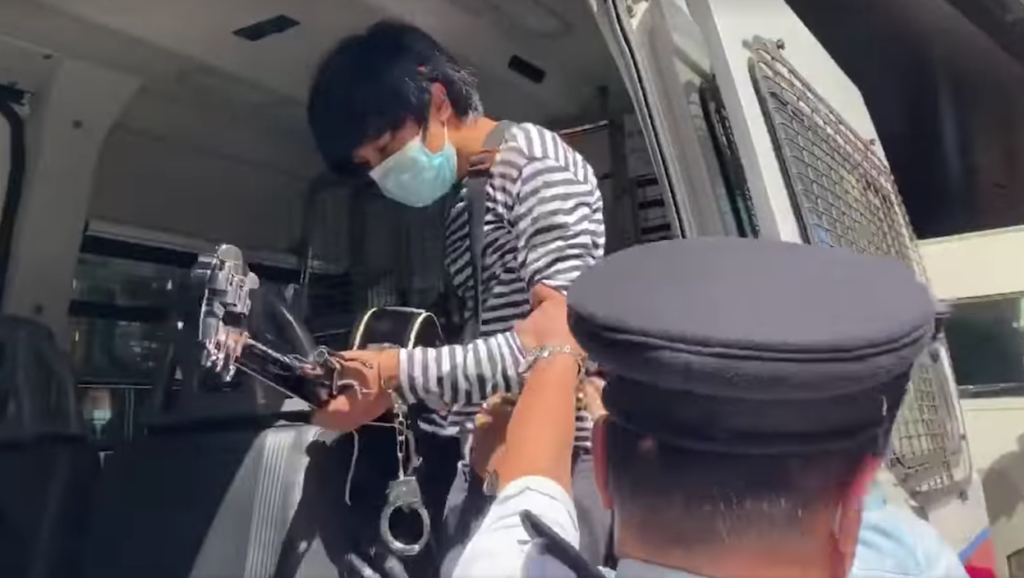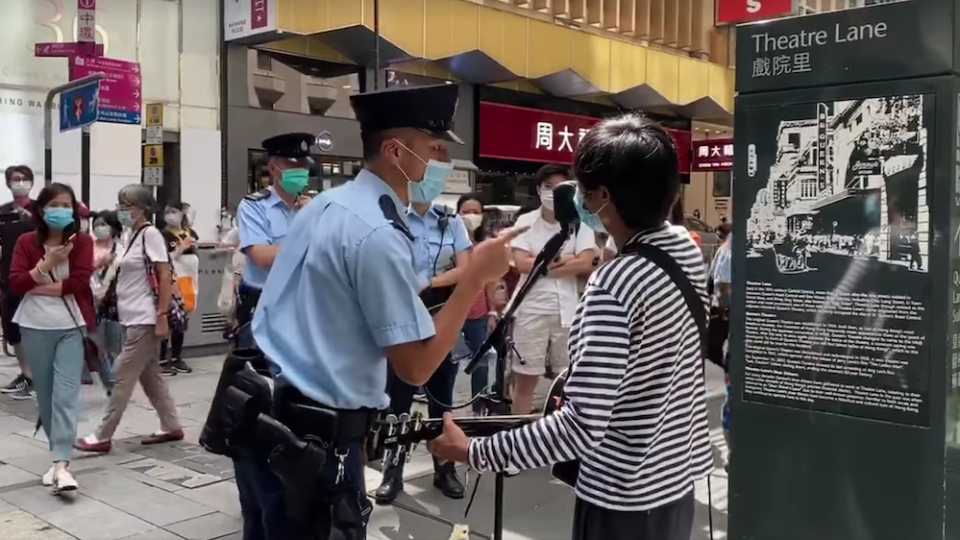Last year, busker Oliver Ma led the crowd in a rendition of “Glory to Hong Kong” in Central as police surrounded him. Passerbys stopped and waved their cellphone lights on the late October evening, a peaceful moment capping a month of often violent protests.
But those days are long gone.
The 21-year-old was arrested while busking on July 27 in Central for a suspected criminal intimidation charge. That afternoon, Ma got into an altercation with an elderly woman working at a newspaper stand nearby who accused him of singing too loudly.
The woman, Ma said, kicked his guitar case and grabbed his mic. When the police arrived, they arrested Ma on the spot.
Less than two weeks later, on August 8, Ma went out to busk for the first time since his arrest—and was detained again. In a video posted by Cheung Kai-yin, a district councillor serving the Central and Western District, Ma is seen performing in front of a small crowd of passerbys on Queen’s Road Central.
Police warn him multiple times to leave. “Pack your things and leave immediately. Don’t attract people to gather,” one officer says.
When an officer lowers the volume on Ma’s amplifier, and Ma turns it back up and begins singing “Glory to Hong Kong.”
Police then clutch Ma’s arms, hold onto his guitar to stop him from playing and tell him he is under arrest for obstructing police officers.
A dubious charge
At the police station, officers informed him that he faced an additional charge: possession of offensive weapon.
Speaking to media for the first time since the arrests, Ma told Coconuts HK that the “offensive weapon” in question was a pair of toy handcuffs he was wearing on his left wrist. In an emailed statement to Coconuts, police also said that they had found a pair of handcuffs on Ma.
“The toy handcuffs were meant for a social commentary,” Ma said. “I was wearing them as a kind of accessory, and I was wearing a black and white striped top too. I was trying to portray myself as a kind of prisoner for a social commentary.”

After Ma was arrested the first time, netizens alerted the incident to Ted Hui, a Legislative Council member who also serves the Central district. When Ma was detained again in August, he arranged for a lawyer to meet him at the police station.
The lawyer told Ma that anything he told police could be used against him, and not to respond to their questions. Taking that advice, Ma said he answered “no comment” when police interrogated him that second time.
Police also told Coconuts they had issued a fine to Ma for not wearing a face mask on August 8. Ma admitted that he was not wearing a mask during the earlier points of his performance.
‘I feel powerless’
Since the passing of the national security law, many say authorities have been making increasingly bold attempts to quell dissenting voices in Hong Kong. Last month, police arrested the founder of pro-democracy news outlet Apple Daily, Jimmy Lai, and conducted a thorough sweep of the newsroom.
Authorities are scrutinizing Liberal Studies textbooks and removing references to the anti-government protests. Just this week, a school suspended a student for a week because he had reportedly displayed a flag with the slogan “Free Hong Kong” in his online classes.
Ma said he thinks the arrests show that freedom of expression in the city is no longer protected, leaving him “powerless.”
“The message I’m getting is you still have the freedom to sing in the street. But the cops can arrest you, because they can,” he said.
Supporters of the protests point out that police do not appear to have taken law enforcement action against da ma—middle-aged Mainland Chinese women who hold street performances, often blaring loud music while dancing—despite complaints about them. Virus restrictions, some agree, have become a guise for authorities to carry out selective policing.
The musician said that he has only gone out busking once since his arrest. He went to Mong Kok, but said he didn’t receive the same warm reception he normally gets in Central, where there are more foreigners. (Ma, who is half-Filipino and half-Chinese, sings in English.)
Ma has qualms about returning to Central, which has become his regular busking haunt over the past three years that he has been performing full-time.
“If I go back to Central [and the police come], do I leave or do I keep singing and get arrested? It’s just going to repeat itself. I’m just really exhausted from that,” Ma said, adding that he won’t be performing publicly anytime soon.




